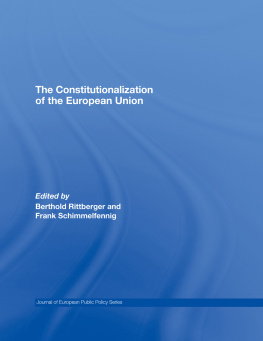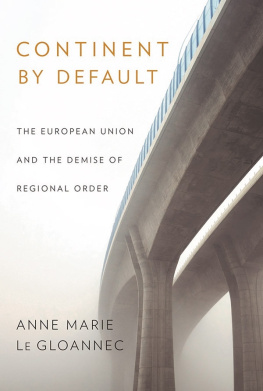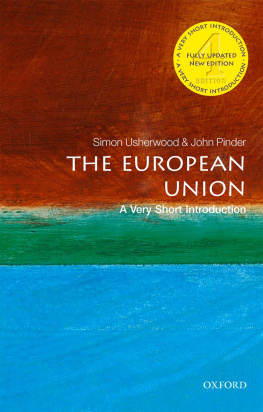The Constitutionalization of the European Union
There exists a consensus among academics, politicians, and the public that the European Union suffers from a democratic deficit. But how can it be resolved?
The Constitutionalization of the European Union deals with two core areas central for the development of the liberal-democratic constitutional state: the extension of the powers of representative assemblies and the institutionalization of human rights. The European Union has made remarkable progress in these two areas over the past half century. This book presents a theory of constitutionalization as well as comparative analyses and case studies to underscore the claim that the European integration process itself engenders a democratic self-healing mechanism. Whenever a planned step of European integration through transfers of sovereignty threatens to undermine domestic standards of parliamentary control and human rights standards, political elites in the member states regularly mobilize to counteract these developments. The proponents of the Unions constitutionalization regularly invoke democratic and human rights norms shared by all members of the European Union to successfully exercise moral pressure on the skeptics of further constitutionalization.
This book was previously published as a special issue of the Journal of European Public Policy.
Berthold Rittberger is Professor of Political Science and Contemporary History at the University of Mannheim.
Frank Schimmelfennig is Professor of European Politics at the Swiss Federal Institute of Technology (ETH), Zurich.
Journal of European Public Policy Series
Series Editor: Jeremy Richardson is Professor at Nuffield College, Oxford University
This series seeks to bring together some of the finest edited works on European Public Policy. Reprinting from Special Issues of the Journal of European Public Policy, the focus is on using a wide range of social sciences approaches, both qualitative and quantitative, to gain a comprehensive and definitive understanding of Public Policy in Europe.
Towards a Federal Europe
Edited by Alexander H. Trechsel
The Disparity of European Integration
Edited by Tanja A. Brzel
Cross-National Policy Convergence:
Causes Concepts and Empirical Findings
Edited by Christoph Knill
Civilian or Military Power?
European Foreign Policy in Perspective
Edited by Helene Sjursen
The European Union and New Trade Politics
Edited by John Peterson and Alasdair R. Young
Comparative Studies of Policy Agendas
Edited by Frank R. Baumgartner, Christoffer Green-Pedersen and Bryan D. Jones
Innovations in Urban Politics
Edited by Jonathan S. Davies
The Constitutionalization of the European Union
Edited by Berthold Rittberger and Frank Schimmelfenig
Empirical and Theoretical Studies in EU Lobbying
Edited by David Coen
Mutual Recognition as a New Mode of Governance
Edited by Susanne K. Schmidt
The Constitutionalization of the European Union
Edited by
Berthold Rittberger and Frank Schimmelfennig
First published 2007 by Routledge
2 Park Square, Milton Park, Abingdon, Oxon OX14 4RN
Simultaneously published in the USA and Canada
by Routledge
270 Madison Avenue, New York, NY 10016
Routledge is an imprint of the Taylor & Francis Group, an informa business
2007 Edited by Berthold Rittberger and Frank Schimmelfennig
Typeset in Agaramond and Franklin Gothic by Techset Composition, Salisbury, UK
Printed and bound in Great Britain by Biddles Digital Ltd, Kings Lynn
All rights reserved. No part of this book may be reprinted or reproduced or utilised in any form or by any electronic, mechanical, or other means, now known or hereafter invented, including photocopying and recording, or in any information storage or retrieval system, without permission in writing from the publishers.
British Library Cataloguing in Publication Data
A catalogue record for this book is available from the British Library
ISBN 10: 0-415-42089-X (hbk)
ISBN 13: 978-0-415-42089-1 (hbk)
Contents
Berthold Rittberger and Frank Schimmelfennig
Berthold Rittberger and Frank Schimmelfennig
Frank Schimmelfennig, Berthold Rittberger, Alexander Brgin and Guido Schwellnus
Daniel C. Thomas
Berthold Rittberger
Wolfgang Wagner
Frank Schimmelfennig
Guido Schwellnus
Sandra Lavenex
R. Daniel Kelemen
Antje Wiener
The preparation of this special issue would not have been possible without the generous financial assistance of the Fritz-Thyssen Foundation which funded this project from 2004 to 2006. The Mannheim Center for European Social Research (MZES) and Nuffield College (Oxford) have been generous in providing an excellent research infrastructure and additional funding for conference participation and field work. We are also grateful to the University Association for Contemporary European Studies (UACES) which funded a project workshop at Nuffield College in June 2005 to discuss preliminary findings with British colleagues. For lively discussions, we wish to thank Giacomo Benedetto, Paul Craig, Lars Hoffmann, Dan Kelemen, Christopher Lord, Emre Ozcan and Antje Wiener. In January 2006 the MZES helped to fund an authors workshop. The contributions by Sandra Lavenex, Daniel Thomas and Wolfgang Wagner bolster the empirical basis of our project. We owe special thanks to Alexander Brgin and Stefan Seidendorf who contributed invaluably to the workshops discussions. We also wish to thank the participants at various talks and conferences at the Free University Berlin, the University of Mannheim, ETH Zurich, Sdertrn University College (Stockholm), the University of Portsmouth, the European Union Studies Association in Austin, the International Studies Association in Honolulu and the German Association for Political Science (DVPW) in Mannheim for their valuable input. Finally, we want to express our gratitude to two referees who did not mind working through the entire manuscript and also to Jeremy Richardson for his unfaltering support of our endeavour.
Berthold Rittberger and Frank Schimmelfennig
Berthold Rittberger and Frank Schimmelfennig
INTRODUCTION
Constitutionalization has become a buzz-word in the study of the European Union (EU). Past years have seen a constant increase in references to constitutionalization in the academic literature and in political commentary. In the academic literature, constitutionalization has traditionally been employed to capture the process of European legal integration which has led to a remarkable transformation of the EU displacing the traditional, state-centred, international organization of the diplomat and the regime of the international relations scholar (Stone Sweet 2003: 18) with a polity which has evolved from a set of legal arrangements binding upon sovereign states into a vertically integrated legal regime conferring judicially enforceable rights and obligations on all legal persons and entities, public and private, within the sphere of application of EC law (Haltern 2002: 2).1 Constitutionalization has thus profoundly affected the EUs legal system as well as national legal systems. The establishment of the doctrines of supremacy and direct effect and the system of judicial review have to a large extent














